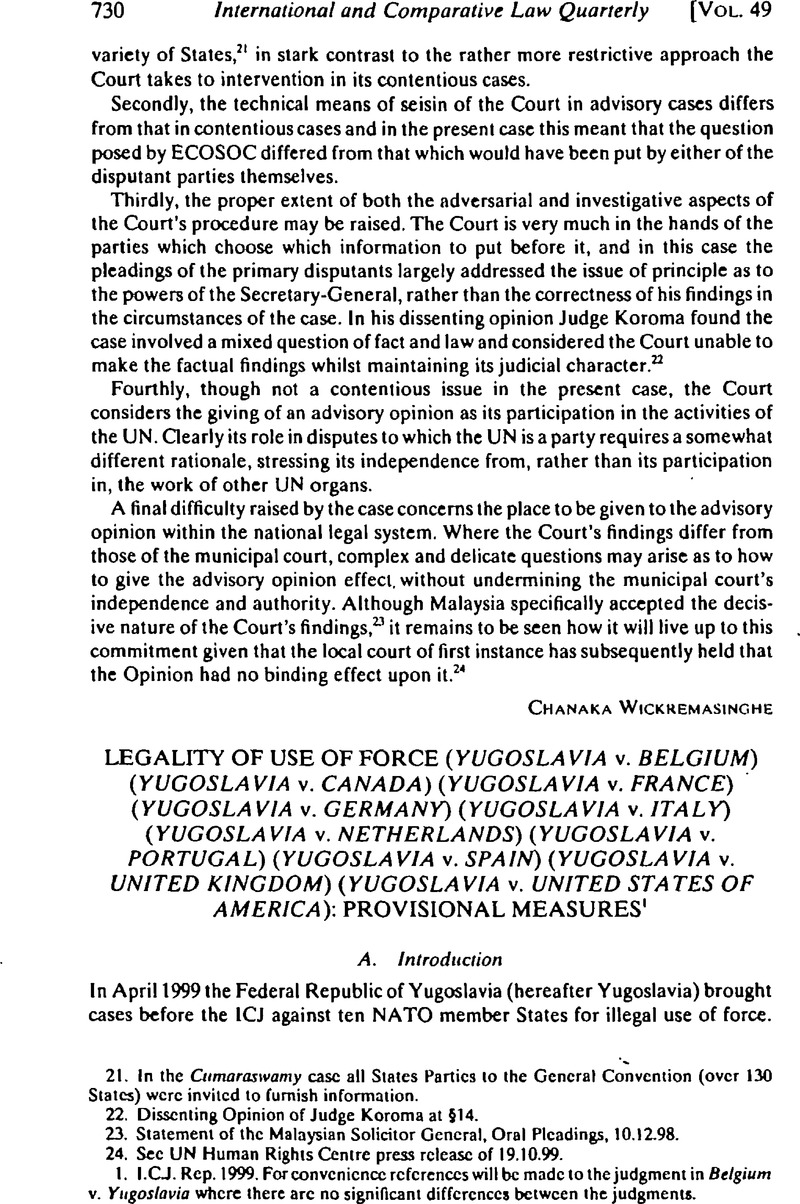Published online by Cambridge University Press: 17 January 2008

2. See also Case concerning the Land and Maritime Boundary between Cameroon and Nigeria (Preliminary Objections) I.C.J. Rep. 1998, 275; Oil Platforms (Islamic Republic of Iran v. USA), Preliminary Objections, I.C.J. Rep. 1996, 803. In 1999 Pakistan brought the Aerial Incident of 10 August 1999 case against India and the Democratic Republic of Congo brought a case on Armed Activities on the Territory of the Congo against Uganda, Rwanda and Burundi.
3. I.C.J. Rep. 1984, 392, paras89–98.
4. For a discussion of the arguments on the legality of the use of force see Gray, “The legality of NATO's military action in Kosovo: is there a right of. humanitarian intervention?”, in International Law in the Post-Cold War World (eds. Tieya, Wang and Routledge, S. Yee, 2000).Google Scholar
5. Belgium v. Yugoslavia, Judgment, paras 16–17.
6. Judge Kreca dissented in nine of the ten cases and gave a Separate Opinion in the case against Spain. Judges Weeramantry, Shi and Vereshchetin dissented in the cases against Belgium, Canada, Netherlands and Portugal, mainly on the question of the proper interpretation of Yugoslavia's Optional Clause declaration.
7. Application of the Convention on the Prevention and Punishment of the Crime of Genocide (Bosnia and Herzegovina), v. Yugoslavia (Serbia and Montenegro) Provisional Measures, Orders of 8 April and 13 September 1993, I.C.J. Rep. 1993, 3, 325, noted by Gray, C., (1994) 43 I.C.L.Q. 704.CrossRefGoogle Scholar
8. In the cases against Belgium and the Netherlands Yugoslavia also invoked treaties of 1930 and 1931 respectively as giving jurisdiction; it did so at the second stage of oral argument. The Court rejected this attempt to bring in new grounds of jurisdiction as jeopardising procedural fairness (Belgium, v. Yugoslavia, Judgment, paras.42–44; Netherlands v. Yugoslavia, Judgment, paras.42–44). Judge Kreca in his Dissenting Opinion criticised this decision as inconsistent with the Court's earlier jurisprudence.
9. There was apparently no support for the view of Judge Oda, expressed earlier in the Bosnia Genocide, case (supra, n.7) and repeated in his Separate Opinion in this case, that Article IX of the Genocide Convention docs not allow actions for State responsibility for genocide. Yugoslavia has apparently reversed its position on this point since the Bosnia Genocide, case.
10. Judge Kreca in his Dissenting Opinion concurred in this with regard to Spain, but he said that the US reservation to Article IX was much more far reaching than Spain's reservation and therefore was an absolute nullity.
11. This is similar to the question before the Court at the Preliminary Objections stage of the Oil Platforms, case: did the Court have jurisdiction over the particular subject matter of the case? (supra, n.2).
12. Belgium, v. Yugoslavia, Judgment, para.40. Judge Kreca in his Dissenting Opinion was critical of the Court for accepting the NATO argument on this crucial issue.
13. These are the Bosnia Genocide, case (supra, n.7) and the new case, Application of the Convention on the Prevention and Punishment of the Crime of Genocide, brought by Croatia against Yugoslavia in 1999.
14. Order of 8 April, at para.8 (supra, n.7).
15. Belgium, v. Yugoslavia, Judgment para.33.
16. It did so even in the case against Belgium where the respondent did not argue this point, preferring to base itself on the claim that Yugoslavia was not a party to the Statute of the Court, Judgment, para.24.
17. Merrills, J. G., “The Optional Clause Revisited”, (1993) 64 B.Y.I.L. 197 at 213–219.Google Scholar
18. Supra, n.6. Judge Koroma also indicated his disagreement with the majority on this point in his Declaration.
19. I.C.J. Rep. 1998, para.49.